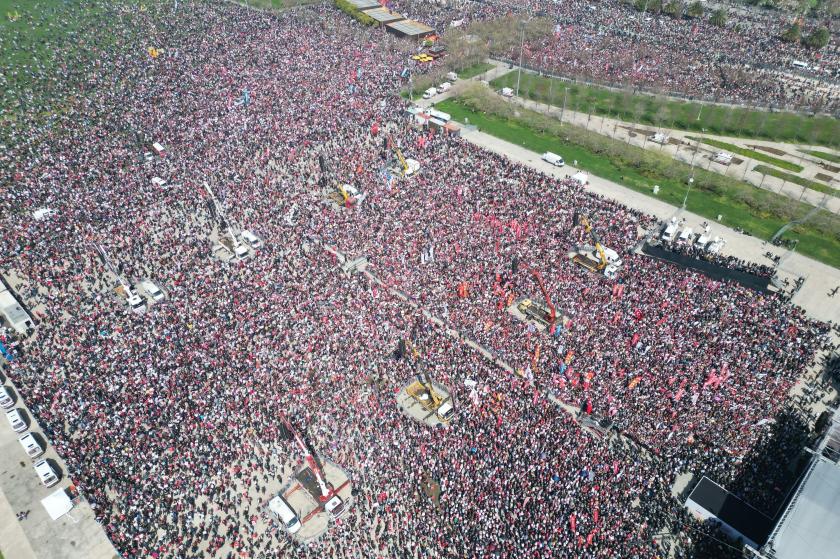Does Assad's return herald Erdogan's departure?

Yusuf Karadaş

Fotoğraf: Volkan Furuncu/AA
Foreign Minister Mevlüt Çavuşoğlu said that the quadrilateral meeting at the level of foreign ministers with Russia, Iran and Syria could be held on 10 May. Çavuşoğlu could not give a definite date even when he pointed to a week later, saying, "It can be realised". Çavuşoğlu's statement not only reveals how eager he is to hold talks with the Syrian government as soon as possible, but also signals that these talks are not progressing as the Erdoğan government hopes. It may be recalled that Çavuşoğlu had previously expressed the expectation that the meeting with Syria at the level of foreign ministers would take place in January, which was based on the expectation that Erdoğan and Assad would meet and take a photo together before the elections.
On 25 April, after a meeting between the defence ministers and intelligence chiefs of Turkey, Russia, Iran, Russia, Iran and Syria, Defence Minister Hulusi Akar said that progress had been made in these talks, but the Syrian side denied this statement. The Assad government says that there will be no "normalisation" until Turkey withdraws its military forces from Syria and stops supporting the jihadists (without announcing a timetable on these issues). As a first step to fulfil these conditions, it wants Turkey to fulfil its commitments to open the M-4 Motorway to safe access. The meeting, which Çavuşoğlu said "could take place", seems to depend on the outcome of the negotiations on this issue.
It should be noted that there are some differences of opinion between Russia, the instigator and mediator of the talks with the Erdoğan administration, and Iran and the Assad regime, which are in co-operation with it. Russia sees no harm in the Erdoğan government turning these talks into a part of its election propaganda. Just as it sees no harm in turning the early opening of the Akkuyu Nuclear Power Plant (the ceremony for the delivery of the first fuel from Russia to the plant), to which Putin and Erdoğan were connected via teleconference, into an election propaganda. This is because the Putin administration wants Erdoğan, whom it sees as useful for its regional policy, to win the elections and continue on his way. On the other hand, the Assad regime sees Erdoğan as the one primarily responsible for what has been happening in Syria since 2011 and therefore does not want to take any step towards "normalisation" until the conditions it puts forward are met. The support it receives from Iran also plays a decisive role in this attitude of the Syrian government. Iranian President Reisi's visit to Damascus and his statement to Assad: "Today, we can say that you are victorious despite the threats and sanctions against you" should be considered as a clear expression of this support.
However, the developments that have strengthened Assad's hand against Erdoğan today, whereas in 2011 it was calculated that he would be overthrown in 6 months, are not only due to Iran's support. Arab countries such as Egypt, Saudi Arabia, UAE and Jordan are also making final preparations for Syria's return to the Arab League. The meetings of the foreign ministers of Egypt, Jordan and Saudi Arabia with Assad in Damascus, Assad's visits to the UAE and Oman, and the recent meeting between the foreign ministers of Saudi Arabia, Jordan, Iraq and Egypt and Syrian Foreign Minister Mikdad, all point to the imminent return of Syria to the Arab League and its role in the regional political scene.
Assad's reacceptance and preparation to return to his role on the political scene may also herald Erdoğan's departure. Because the overthrow of Assad was the starting point of the Erdoğan administration's claim to redesign the region, embellished with neo-Ottomanist dreams, and to make Turkey the leading country in the region. Today, Erdoğan has not only failed to overthrow Assad, but is also trying to develop relations under the name of "normalisation" with the leaders of the countries in the region, whom he had previously declared "coup plotters", "financiers of the 15 July coup attempt" and "murderers". The regional reactionaries such as S. Arabia, UAE, Egypt and Israel are using the squeeze that Erdoğan's government is experiencing to extract new concessions from him under the name of "Normalisation".
While this is the case, the pro-government media organs are propagandising "Turkey and Islamic countries need a strong leader like Erdoğan" as if mocking the human mind. However, apart from the threats Turkey faces, there is no second leader who has harmed the peoples of the region as much as Erdoğan in the last 20 years!
Not only the countries in the region such as Syria and Iraq, but also the people of Turkey paid the bill for the destruction and brutality caused by the jihadist groups it supported to overthrow Assad with bombs and massacres. Not only that, it also used these jihadist militants in the Libyan war and became one of the architects of the destruction and chaos in Libya. The Ikhwanists (Muslim Brotherhood), whom it supported in Egypt and Tunisia, became the main actors of the construction of reactionary regimes again by frustrating the demands and aspirations of the peoples who overthrew the dictators for change, humane life, democracy and secularism. Due to the persistently warlike policy on the Kurdish question, which could have been solved without a single person's nose bleeding - and this policy was and is used as a basis for both expansionist ambitions and the domestic repression regime - not only were the country's resources spent on war while the people were experiencing economic devastation, but the insolubility of the Kurdish question was deepened and Turkey was made to deal with this problem in wider areas.
As it is known, the main reason why the Erdoğan government wanted to establish relations with the Syrian government under the name of "normalisation" was not to turn back from its mistakes in Syria and the region. On the contrary, through these relations and negotiations, he wanted to create an environment for a military operation against the Syrian Kurds before the elections, to turn this operation into a tool of nationalist propaganda and to get rid of the pressure on the solution of the refugee problem.
Going back to the beginning, today Çavuşoğlu's statement that the date of 10 May for the quadrilateral meeting at the level of foreign ministers is an expectation/hope should be read as an expression of the position gained by the Assad administration and the loss of power of the Erdoğan government. We will soon find out how this loss of power of the Erdoğan government will be reflected on the ballot box and whether Assad's return is a harbinger of Erdoğan's departure.




Follow Evrensel